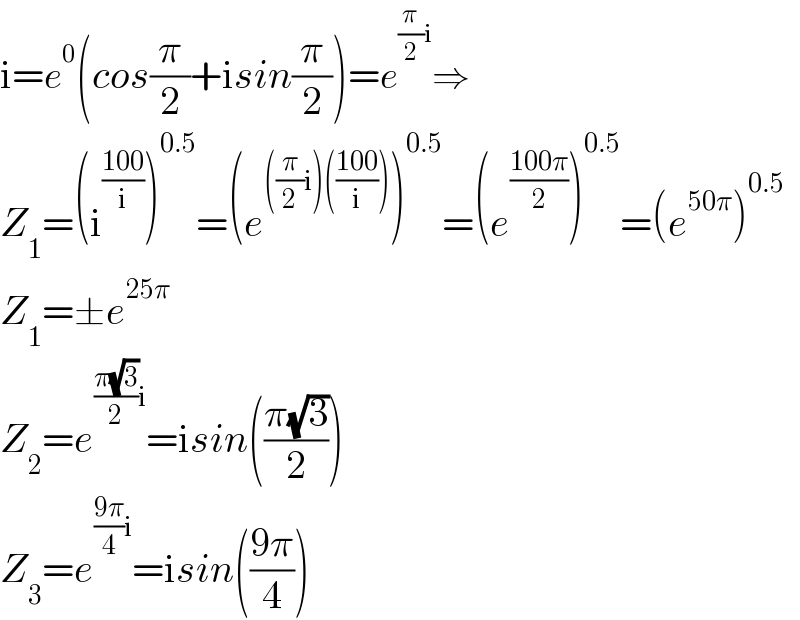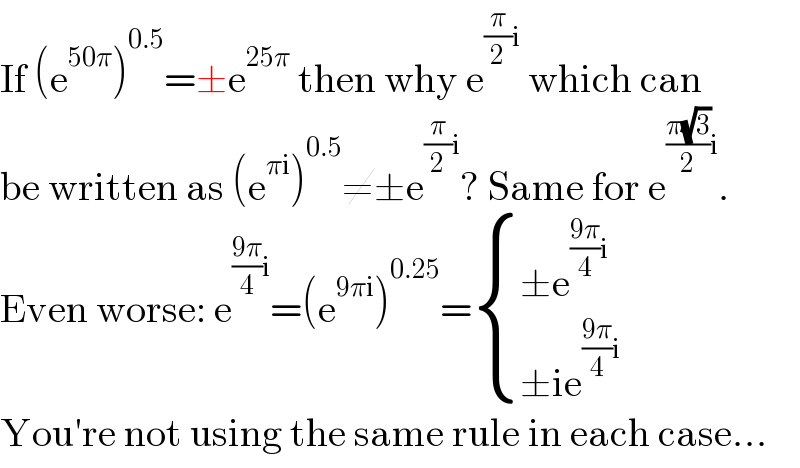Question Number 184481 by yaslm last updated on 07/Jan/23

Answered by mahdipoor last updated on 07/Jan/23

$$\mathrm{i}={e}^{\mathrm{0}} \left({cos}\frac{\pi}{\mathrm{2}}+\mathrm{i}{sin}\frac{\pi}{\mathrm{2}}\right)={e}^{\frac{\pi}{\mathrm{2}}\mathrm{i}} \Rightarrow \\ $$$${Z}_{\mathrm{1}} =\left(\mathrm{i}^{\frac{\mathrm{100}}{\mathrm{i}}} \right)^{\mathrm{0}.\mathrm{5}} =\left({e}^{\left(\frac{\pi}{\mathrm{2}}\mathrm{i}\right)\left(\frac{\mathrm{100}}{\mathrm{i}}\right)} \right)^{\mathrm{0}.\mathrm{5}} =\left({e}^{\frac{\mathrm{100}\pi}{\mathrm{2}}} \right)^{\mathrm{0}.\mathrm{5}} =\left({e}^{\mathrm{50}\pi} \right)^{\mathrm{0}.\mathrm{5}} \\ $$$${Z}_{\mathrm{1}} =\pm{e}^{\mathrm{25}\pi} \:\:\:\:\: \\ $$$${Z}_{\mathrm{2}} ={e}^{\frac{\pi\sqrt{\mathrm{3}}}{\mathrm{2}}\mathrm{i}} =\mathrm{i}{sin}\left(\frac{\pi\sqrt{\mathrm{3}}}{\mathrm{2}}\right) \\ $$$${Z}_{\mathrm{3}} ={e}^{\frac{\mathrm{9}\pi}{\mathrm{4}}\mathrm{i}} =\mathrm{i}{sin}\left(\frac{\mathrm{9}\pi}{\mathrm{4}}\right) \\ $$
Commented by yaslm last updated on 07/Jan/23
thanks complete sir
Commented by Frix last updated on 07/Jan/23

$$\mathrm{If}\:\left(\mathrm{e}^{\mathrm{50}\pi} \right)^{\mathrm{0}.\mathrm{5}} =\pm\mathrm{e}^{\mathrm{25}\pi} \:\mathrm{then}\:\mathrm{why}\:\mathrm{e}^{\frac{\pi}{\mathrm{2}}\mathrm{i}} \:\mathrm{which}\:\mathrm{can} \\ $$$$\mathrm{be}\:\mathrm{written}\:\mathrm{as}\:\left(\mathrm{e}^{\pi\mathrm{i}} \right)^{\mathrm{0}.\mathrm{5}} \neq\pm\mathrm{e}^{\frac{\pi}{\mathrm{2}}\mathrm{i}} ?\:\mathrm{Same}\:\mathrm{for}\:\mathrm{e}^{\frac{\pi\sqrt{\mathrm{3}}}{\mathrm{2}}\mathrm{i}} . \\ $$$$\mathrm{Even}\:\mathrm{worse}:\:\mathrm{e}^{\frac{\mathrm{9}\pi}{\mathrm{4}}\mathrm{i}} =\left(\mathrm{e}^{\mathrm{9}\pi\mathrm{i}} \right)^{\mathrm{0}.\mathrm{25}} =\begin{cases}{\pm\mathrm{e}^{\frac{\mathrm{9}\pi}{\mathrm{4}}\mathrm{i}} }\\{\pm\mathrm{ie}^{\frac{\mathrm{9}\pi}{\mathrm{4}}\mathrm{i}} }\end{cases} \\ $$$$\mathrm{You}'\mathrm{re}\:\mathrm{not}\:\mathrm{using}\:\mathrm{the}\:\mathrm{same}\:\mathrm{rule}\:\mathrm{in}\:\mathrm{each}\:\mathrm{case}… \\ $$
Answered by Frix last updated on 07/Jan/23

$${z}={r}\mathrm{e}^{\mathrm{i}\theta} ;\:{r}=\mid{z}\mid\:\Rightarrow\:{r}\in\mathbb{R}_{\mathrm{0}} ^{+} ;\:−\pi<\theta\leqslant\pi \\ $$$${z}^{{c}} ={r}^{{c}} \mathrm{e}^{\mathrm{i}{c}\theta} \forall{c}\in\mathbb{Z}\:\mathrm{which}\:\mathrm{is}\:\mathrm{always}\:\mathrm{unique} \\ $$$$ \\ $$$${Z}_{\mathrm{1}} =\sqrt{\mathrm{i}^{−\mathrm{100i}} }=\sqrt{\left(\mathrm{e}^{\mathrm{i}\frac{\pi}{\mathrm{2}}} \right)^{−\mathrm{100i}} }=\sqrt{\mathrm{e}^{−\mathrm{50}\pi\mathrm{i}^{\mathrm{2}} } }=\sqrt{\mathrm{e}^{\mathrm{50}\pi} }=\mathrm{e}^{\mathrm{25}\pi} \\ $$$${Z}_{\mathrm{2}} =\mathrm{i}^{\sqrt{\mathrm{3}}} =\left(\mathrm{e}^{\mathrm{i}\frac{\pi}{\mathrm{2}}} \right)^{\sqrt{\mathrm{3}}} =\mathrm{e}^{\mathrm{i}\frac{\pi\sqrt{\mathrm{3}}}{\mathrm{2}}} =\mathrm{cos}\:\frac{\pi\sqrt{\mathrm{3}}}{\mathrm{2}}\:+\mathrm{i}\:\mathrm{sin}\:\frac{\pi\sqrt{\mathrm{3}}}{\mathrm{2}} \\ $$$${Z}_{\mathrm{3}} =\mathrm{i}^{\frac{\mathrm{9}}{\mathrm{2}}} =\left(\mathrm{e}^{\mathrm{i}\frac{\pi}{\mathrm{2}}} \right)^{\frac{\mathrm{9}}{\mathrm{2}}} =\mathrm{e}^{\mathrm{i}\frac{\mathrm{9}\pi}{\mathrm{4}}} =\mathrm{e}^{\mathrm{i}\frac{\pi}{\mathrm{4}}} =\frac{\sqrt{\mathrm{2}}}{\mathrm{2}}+\frac{\sqrt{\mathrm{2}}}{\mathrm{2}}\mathrm{i} \\ $$
